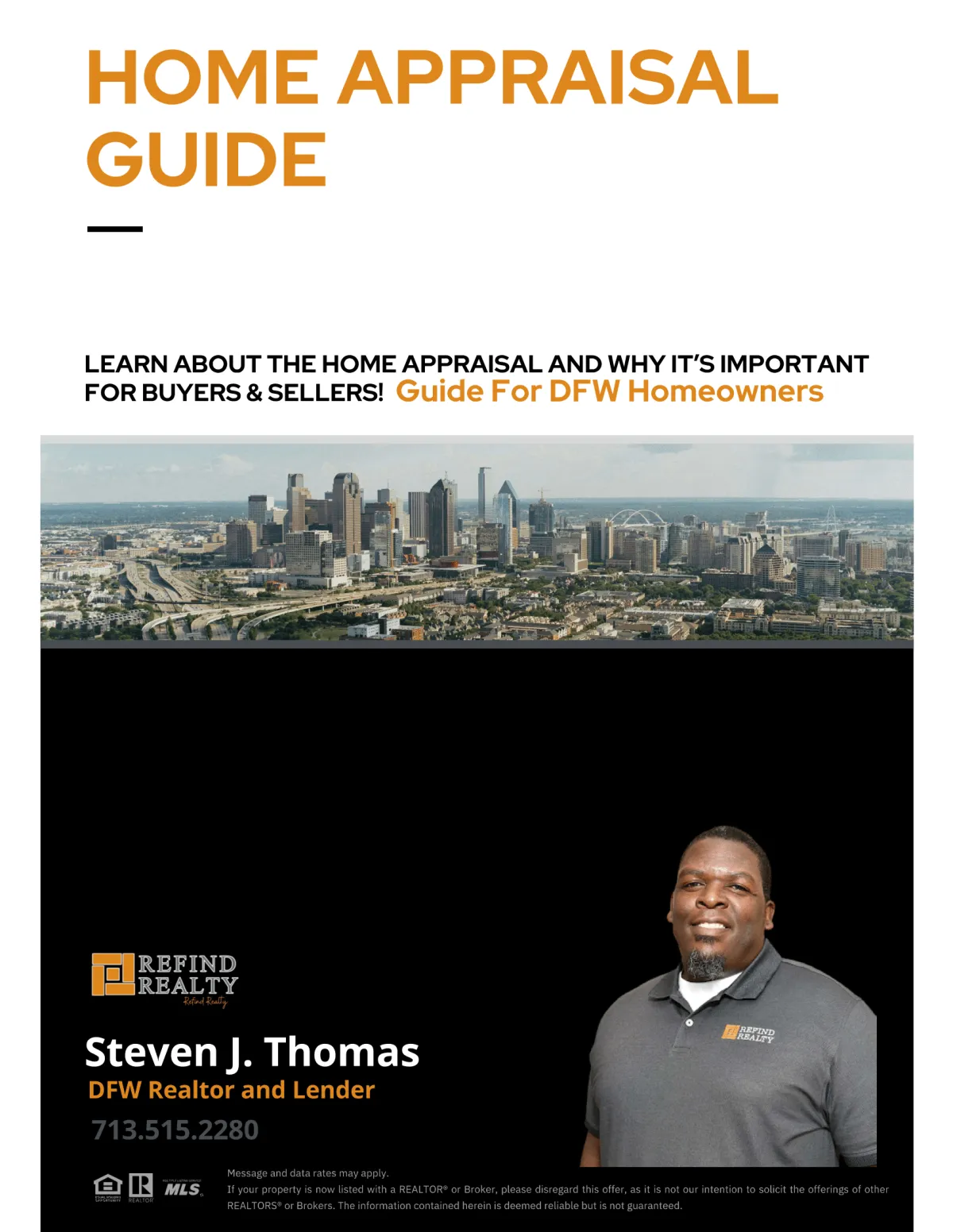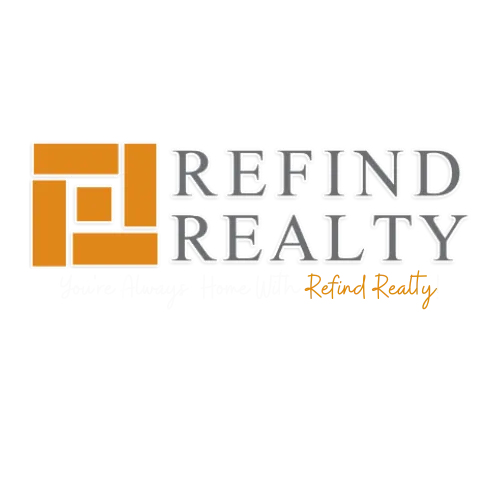You're Always At Home With Refind Realty.
Serving Your DFW Real Estate Needs Since 2005.
We Help You Buy and Sell in The Greater Dallas-Fort Worth Area.
Check Out Our Social Media Channels!
Buying in DFW
Buying your first or next home should be a rewarding and exciting time in your life, and one that you look back on with fond memories.
Thinking Of selling?
The market has changed a lot and I'd love to show you the exact strategy I use to get sellers in DFW top dollar for their property.
Get Pre-Approved
Let me walk you through the entire pre-approval process so you know exactly how much home you can afford.
We Help You Buy and Sell in The Greater Dallas-Fort Worth Area.
Check Out Our Social Media Channels!
Sign Up For my
Email List
My emails are a great way to stay up-to-date with local news and real estate market trends, even if you're not currently in the market. So, come on and join me to stay in the loop!
affordability Calculator
Get pre-approved to know exactly how much house you can afford. Use this calculator to get a quick estimate. Contact me for assistance!
DFW New Construction
Discover the latest new home constructions in DFW and take advantage of the builder incentives that are available now.
Let's Make Your real estate Dreams Come True.
Newest Listings
Call Me Today At (713) 505-2280

Refind Realty Blog:


The Ultimate DFW Closing Checklist: What Buyers & Sellers Need in 2025
The Ultimate DFW Closing Checklist: What Buyers & Sellers Need in 2025
Custom HTML/CSS/JAVASCRIPT
By Steven J. Thomas

Closing day is the finish line of your real estate journey. While it’s a reason to celebrate, it’s also the moment when a handful of critical tasks must be completed. A small mistake can create big delays. This guide provides a step-by-step closing checklist for both buyers and sellers in the Dallas–Fort Worth market, so you can walk away from the table with confidence in 2025.
Direct Answer
To ensure a smooth DFW closing in 2025:
Buyers should complete a final walkthrough, confirm loan approval, and bring verified funds (cashier’s check or wire) for closing costs.
Sellers should finish all agreed repairs, gather keys and access devices, and provide documents such as a mortgage payoff statement.
Both parties must carefully review the Closing Disclosure and maintain close communication with their real estate agent to avoid last-minute issues.
Buyer’s Pre-Closing Checklist (3–7 Days Before)
Your lender and agent will guide you, but here’s what to confirm:
Final Walkthrough: Inspect the property to ensure agreed-upon repairs are complete and the home is in the expected condition.
Review the Closing Disclosure: Compare this document (delivered at least 3 business days before closing) against your Loan Estimate. Watch for surprises.
Secure Closing Funds: Arrange a cashier’s check or wire transfer for your down payment and closing costs. ⚠️ Always confirm wiring instructions directly with your title company to avoid fraud.
Confirm Homeowners Insurance: Proof of insurance is required. Ensure coverage is active before closing.
Gather Your Documents: Bring a government-issued photo ID, your purchase contract, and any requested financial records.
💡 Pro Tip: Do not make major financial changes (like buying a car, opening new credit, or changing jobs) before closing. Even small changes can disrupt your loan approval.
Seller’s Pre-Closing Checklist (3–7 Days Before)
Your job isn’t done until the documents are signed and keys are handed over. Make sure to:
Complete Final Repairs & Cleaning: Finish agreed-upon fixes and leave the home clean for buyers.
Gather Keys & Remotes: Include garage openers, security codes, mailbox keys, and appliance manuals.
Coordinate Utilities: Arrange shutoff or transfer dates to avoid post-closing bills.
Request Mortgage Payoff Statement: Confirm with your title company that the payoff amount is accurate and ready.
Plan Your Move: Ensure all belongings are removed—an incomplete move-out is a top cause of delayed closings.
Common Closing-Day Issues to Avoid
Loan Approval Problems: Last-minute credit changes or missing documents can stall approval.
Title Issues: Liens, disputes, or clerical errors uncovered in the title search must be resolved.
Inspection/Repair Disputes: Disagreements on credits or unfinished repairs can derail signing.
Unprepared Funds: Personal checks are not accepted—use a cashier’s check or verified wire only.
Conclusion
A smooth closing is the result of planning, organization, and proactive communication. By following this checklist, both buyers and sellers can avoid pitfalls and confidently complete their DFW home transaction in 2025. You’ve worked hard to reach this milestone—don’t let small details cause delays.
Key Takeaways
Buyers: Do a final walkthrough, verify funds, and review the Closing Disclosure.
Sellers: Complete repairs, hand over keys/remotes, and confirm payoff details.
Both: Bring proper ID, communicate with your agent, and avoid last-minute changes.
Preparation is the best way to keep closing day stress-free.
FAQ: DFW Closing Process
How long does a typical closing take in DFW?
The signing appointment usually takes 1–2 hours. From contract to closing, expect 30–45 days.
Who pays the closing costs in Texas?
Buyers typically pay most closing costs (2–5% of purchase price), though some fees may be negotiated.
What is the title company’s role?
They act as a neutral third party, ensuring funds are transferred correctly and the title is clear.
What if an issue is found during the final walkthrough?
Your agent will negotiate for repairs or a credit at closing to resolve the issue.
Do I need an attorney for closing in Texas?
It’s not legally required, but an attorney can provide peace of mind—especially in complex transactions.
Stay Informed With My Downloadable
Buyer and Seller guides

6 Smart Ways to Build Home Equity

7 Insider Secrets To Selling Your Home w/o a Lot of Time or Money

DFW Home Seller Negotiation Secrets

Home Appraisals Guide

Avoiding Pitfalls That Can Derail Your Home's Sale

Ultimate Guide To Buying a Home

A First Time Homebuyers Guide In DFW

Are You Ready To Buy?

25 Insider Secrets To Buying A Home

How to Improve Your Credit
Download All My Guides For Free
Unable to find form
(I'll send you all 10)

Refind Realty DFW
50+ 5 Star Reviews
Over $90,000,000 in Total Real Estate Sales
267+ Properties Sold

Wondering What Your DFW Home Could Be Worth in 2024?
Get a Professional Home Valuation From A Local Market Expert
Unlock insights into potential selling prices.
Get a personalized analysis sent directly to your inbox.
Stay ahead with updates on property value fluctuations.
Benchmark your property against neighborhood listings.
Get a FREE Home Valuation And Potential Net Sheet:
Unable to find form


Mr. Thomas real-estate company performed a outstanding job handling my transaction in buying my beautiful new home. I would recommend him to all my family and friends in the future.
{user.name}}


Steven was very knowledgeable about the questions I had and very attentive to my needs and wants of buying a house. His approach was as if he was buying the house for himself. That led me to trust his knowledge and expertise. Thomas for your next purchase of a home. He also worked with me every step of the process and helped me to understand and that made it less stressful In buying a home. I highly recommend Refind Realty and Steven On your first or next purchase. I start 2024 with a new build house with equity going in the door. Thank you Steven
{{user.name}}


Steve did a great job helping during this journey he was very communicative with everything and his response time was very quick every time we had a question. I really recommend him and his office to everyone who want any real state services.
{{user.name}}

Ask Us Anything
Frequently Asked Questions
Why do you need a Realtor?
When buying or selling a home, there are so many options…which can also present a lot of obstacles. Laws change, forms change, and practices change all the time in the real estate industry. Because it’s our job to stay on top of those things, hiring a realtor reduces risk, and can also save you a lot of money in the long run.
When you work with me as your Realtor, you’re getting an expert who knows the area; knows how to skillfully guide your experience as a seller or buyer; can easily spot the difference between a good deal and a great deal. My job is to translate your dream into a real estate reality, and I work hard to earn and keep my business. This also means earning your trust: When you work with me, you’ll be working with a realtor who looks out for your best interests and is invested in your goals.
Which loan should you choose?
There are two different types of loans conventional loans and government-backed loans. The main difference is who insures these loans:
1 - Government-backed loans (FHA, VA and USDA):
(a) - Are, unsurprisingly, backed by the government.
(b) - Include FHA loans, VA loans, and USDA loans.
(c) - Make up less than 40 percent of the home loans generated in the U.S. each year.
2 - Conventional loans
(a) - Are not backed by the government.
(b) - Include conforming and non-conforming loans (such as jumbo loans).
(c) - Make up more than 60 percent of the loans generated in the U.S. each year.
What is the difference between FHA, VA and USDA loans?
1 - FHA LOANS:
FHA loans, which are insured by the Federal Housing Administration, are typically designed to meet the needs of first-time homebuyers with low or moderate incomes. FHA loans can be approved with a down payment of as little as 3.5 percent and a credit score as low as 580.
FHA loans are often called “helper loans,” because they give a leg up to potential borrowers who may not be able to secure one otherwise. For this reason, FHA loans have maximum lending limits, which are determined based on housing values for the county where the for-sale home is located.
Because the agency is taking on more risk by insuring FHA loans, the borrower is expected to pay mortgage insurance both at the time of closing and on a monthly basis, and the property must be owner-occupied.
2 - VA LOANS:
VA loans are backed by the Department of Veterans Affairs and they are guaranteed to qualified veterans and active-duty personnel and their spouses. VA loans can be approved with 100 percent financing, meaning VA borrowers are not required to make a down payment.
Unlike FHA loans, borrowers do not have to pay mortgage insurance on VA loans.
3 - USDA LOANS:
You may also hear about USDA loans, which are backed by the United States Department of Agriculture mortgage program. USDA loans are intended to support homeowners who purchase homes in rural and some suburban areas. USDA loans do not require a down payment and may offer lower interest rates; borrowers may have to pay a small mortgage insurance premium in order to offset the lender’s risk.
What’s a conventional loan? Understanding what it means to be conforming and non-conforming
Buyers who have a more established credit history and a larger down payment may prefer to apply for a conventional loan. These loans may offer a lower interest rate and only require the home buyer to purchase monthly mortgage insurance while the loan-to-value ratio is above a certain percentage, so a conventional loan borrower can typically save money in the long run.
Conventional loans are divided into two types: Conforming loans and non-conforming loans.
1 - CONFORMING LOANS:
Conforming loans are those that meet (or conform to) predetermined standards set by Fannie Mae and Freddie Mac — two government-sponsored institutions that buy and sell mortgages on the secondary market. By selling the loans to "Fannie and Freddie," lenders can free up their capital and return to issue more mortgages than if they had to personally back every loan that they approve.
The main standard for conforming loans is that the amount borrowed must be under a certain amount; in Alaska, a single-family home loan must be under $647,200 in order to be considered conforming.
Properties with more than one unit have higher limits.
2 - NON-CONFORMING (JUMBO) LOANS:
But what happens if a borrower wants to borrow more than the Freddie- and Fannie-approved loan amount? In this case, they would have to apply for a “jumbo loan,” which is the most common type of non-conforming loan.
Because the lender cannot resell the jumbo loan (or any non-conforming loan) to Freddie Mac or Fannie Mae, jumbo loans are considered to be riskier than a conforming loan. To protect against this risk, the bank will typically require a higher down payment; the interest rate on a jumbo loan may also be higher than if the same borrower applied for a conforming loan.
What kind of rate should you choose?
Rate types: Fixed-rate vs. adjustable-rate mortgages.
In addition to the loan type you choose, you’ll also have to determine if you want a fixed-rate mortgage or an adjustable-rate mortgage (ARM). A fixed-rate mortgage has an interest rate that does not change for the life of the loan, so it provides predictable monthly payments of principal and interest.
An adjustable-rate mortgage typically offers an initial introductory period with a low-interest rate. Once this period is over, the interest rate adjusts periodically, based on the market index. The initial interest rate on an ARM can sometimes be locked in for different periods, such as one, three, five, seven, or 10 years. Once the introductory period is over, the interest rate typically readjusts annually.
Office 1229 E. Pleasant Run Ste 224, DeSoto TX 75115
Call :(713) 505-2280
Email: [email protected]
Site: www.stevenjthomas.com


Facebook
Instagram
X
LinkedIn
Youtube
TikTok